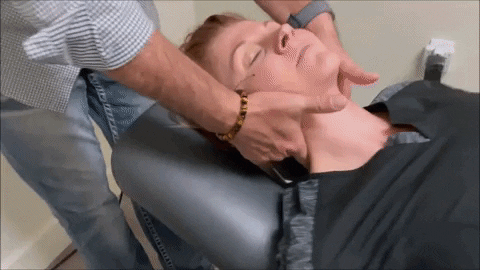Watch Yo' Mouth
Want to listen, instead?
We couldn’t resist asking the robots for help! Check out this AI-built podcast episode for a fun way to consume our sweet, sweet content.
Everything You Need to Know About TMJ Issues
We’ve all been there—after a long, stressful day, you find yourself clenching your jaw like you're about to fight off a horde of zombies. Or maybe you wake up with sore teeth and a stiff jaw, feeling like you’ve been in a wrestling match overnight. If this sounds familiar, you might be dealing with TMJ (temporomandibular joint) issues. Let’s break it down, because your jaw deserves better than all that tension!
What is TMJ, Anyway?
The temporomandibular joint (TMJ) is a fancy name for the hinge that connects your jaw to your skull. You have one on each side of your jaw, and these little joints are the unsung heroes that let you chew, talk, and yes, sometimes even yawn without much thought. However, when things go awry, it can lead to pain, discomfort, and, well, a serious case of “I can’t deal with my jaw right now.”
So, what causes TMJ issues? It’s usually a mix of factors like genetics, arthritis, jaw injury, and, of course, that beloved habit of grinding or clenching your teeth (also known as bruxism). A lot of people are unaware they’re doing it, especially at night or during stressful situations. But the result is often the same: a sore jaw, headaches, or even difficulty chewing your favorite snack. Yikes!
What Are the Signs and Symptoms of TMJ Disorders?
TMJ disorders can sneak up on you in a variety of ways. Here are some common signs you might be dealing with TMJ:
Jaw pain or tenderness (in one or both sides)
Pain near the ear or around the jawline
Difficulty chewing or pain while chewing
Aching facial pain
Clicking or grating sounds when you open or close your mouth
Locked jaw, making it hard to open or close your mouth
Headaches (especially in the temples)
Disrupted sleep (either for you or your bed partner)
Worn or broken teeth (from excessive grinding)
If you’ve been noticing any of these symptoms, it’s time to pay attention. While the occasional jaw click isn’t cause for alarm, if it comes with pain or limits your movement, you may have a TMJ disorder.
What Causes TMJ Pain?
The TMJ itself is a complex little joint. It combines a hinge action with sliding motions, and the bones are covered with cartilage, separated by a tiny shock-absorbing disk. Painful TMJ issues usually occur when:
The disk gets displaced or moves out of alignment
Cartilage is damaged (hello, arthritis)
Trauma from an injury (yes, even a bad fall can mess with your jaw)
Teeth grinding or jaw clenching (which most of us do under stress without even realizing)
If you’re constantly grinding your teeth or clenching your jaw, you’re putting extra stress on the TMJ, which can cause pain and dysfunction over time. That’s why it’s so important to find a way to relax the jaw—especially at night.
How to Treat TMJ Issues
Now, here’s where it gets fun: there are plenty of ways to manage and treat TMJ disorders without resorting to surgery (because who wants that, right?). Here's a breakdown of some effective treatments, many of which you can try at home.
1. Mouth Guards and Splints
If you grind your teeth or clench your jaw at night, a mouth guard or splint is a game-changer. These devices act as a physical barrier between your teeth, reducing the pressure and preventing further damage. You can get a custom-fit one from your dentist, or if you're looking to save a few bucks, a standard mouth guard from the pharmacy works too.
2. Stretching and Massage
One of the best things you can do for your jaw is stretching and self-massage. Gently stretching the jaw muscles can help reduce tension. You can also use your hands or a massage tool to massage the muscles around the jaw, neck, and temples to relieve pressure.
3. Heat or Cold Therapy
A warm compress or ice pack can work wonders for easing jaw pain. Heat can help relax tight muscles, while ice reduces inflammation. Try both and see which works best for you.
4. Pain Relievers
Over-the-counter pain meds like ibuprofen or acetaminophen can help reduce pain and inflammation. If your pain is more severe, talk to your doctor about stronger options (and don't forget the warm compress while you wait for the meds to kick in).
5. Botox
Yes, you read that right—Botox isn’t just for smoothing out wrinkles. Injections into the jaw muscles can help reduce spasms and relieve tension. It’s not a permanent solution, but the relief can last for several months.
6. Chiropractic Care
A chiropractor can help treat TMJ disorders by adjusting the neck, massaging tense muscles, and mobilizing the jaw to improve function. At Elevated Chiropractic, we use gentle techniques to help your jaw move better and reduce pain. We also work on the muscles surrounding the TMJ, which helps prevent further discomfort.
7. Acupuncture
Believe it or not, acupuncture can also help with TMJ pain. A trained specialist can target specific pressure points around the jaw and neck to help relieve muscle tension and promote healing. It’s an effective, natural way to reduce pain and inflammation.
8. Relaxation Techniques
We get it—life is stressful, but consciously relaxing your jaw can do wonders for TMJ. Try to make it a habit to regularly relax your jaw, especially when you’re concentrating or feeling stressed. A simple tip is to place the tip of your tongue to the roof of your mouth, allowing your jaw to drop and relax.
9. Cognitive Behavioral Therapy (CBT)
Since stress and anxiety can exacerbate TMJ issues, CBT or other forms of counseling may be helpful for learning how to manage those stress triggers. A relaxed mind often equals a relaxed jaw!
Let’s Keep Your Jaw in Check
TMJ disorders don’t have to be something you simply "live with." With the right combination of treatments, you can reduce pain, improve function, and get back to your daily life without all the jaw clenching. If you're experiencing jaw pain, headaches, or facial discomfort, don’t hesitate to reach out for a consultation. We’re here to help you relax your jaw and get your smile back on track!
So, watch your mouth—your jaw will thank you!







